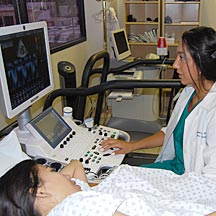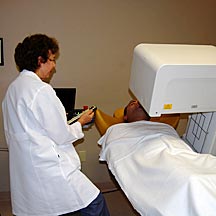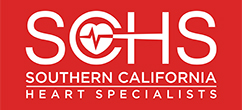Southern California Heart Specialists Services
Clinical Trials
At Southern California Heart Specialist we strive to provide our patients with the most innovative medical treatments available. We have partnered with Profound Research, a leading clinical site network, to offer treatments currently available through clinical trials.
Explore our current clinical trial opportunities and find out if you or a loved one are eligible to participate. Learn More…
Holter Monitoring/Event Monitoring
About Your Diagnostic Test ...
Our diagnostic testing center offers state-of-the-art technology, including EKG, treadmill testing, nuclear stress testing, T-Wave testing, Holter and event monitoring, rest and stress exercise echocardiography, carotid ultrasound, pacemaker and AICD surveillance, and Ankle Brachial Index.
These non-invasive tests provide our cardiologists with information about the function of your cardiovascular system, so that we may best determine how to protect your heart health.
Pacemaker and Defibrillator Surveillance
Carotid Ultrasound
Echocardiography
 An echocardiogram utilizes sound waves to produce a picture of the heart and its valves in motion. Moving a hand-held device across your chest transmits an image that is taped for analysis by your cardiologist. Echocardiograms can reveal the strength of the heart, heart valve problems, cause of enlarged hearts, as well as congenital heart defects, pericardial disease and effects of coronary disease.
An echocardiogram utilizes sound waves to produce a picture of the heart and its valves in motion. Moving a hand-held device across your chest transmits an image that is taped for analysis by your cardiologist. Echocardiograms can reveal the strength of the heart, heart valve problems, cause of enlarged hearts, as well as congenital heart defects, pericardial disease and effects of coronary disease.Stress Exercise Echocardiography
Stress Testing: Treadmill
 The primary purpose of this test is to evaluate the heart for blockages of the coronary arteries. Treadmill testing evaluates the heart’s response to physical exercise. You will walk on a treadmill, which gradually increases in speed and elevation. During the entire test, your EKG, heart rate rhythm, blood pressure and symptoms are monitored by a physician, nurse or cardiovascular technician.
The primary purpose of this test is to evaluate the heart for blockages of the coronary arteries. Treadmill testing evaluates the heart’s response to physical exercise. You will walk on a treadmill, which gradually increases in speed and elevation. During the entire test, your EKG, heart rate rhythm, blood pressure and symptoms are monitored by a physician, nurse or cardiovascular technician.Pharmacologic Stress Testing: Adenosine
Abi-Ankle-Brachial Index
Nuclear Stress Testing and Heart Disease
 Nuclear cardiology is widely used to establish the diagnosis of heart disease, measure the disease extent, and plan treatment. Nuclear cardiology examinations are used to assess blood flow to the heart, show the size and location of any prior heart attacks and evaluate the pumping function of the heart. These tests are safe and noninvasive.
Nuclear cardiology is widely used to establish the diagnosis of heart disease, measure the disease extent, and plan treatment. Nuclear cardiology examinations are used to assess blood flow to the heart, show the size and location of any prior heart attacks and evaluate the pumping function of the heart. These tests are safe and noninvasive.
Imaging uses very small doses of a radioactive imaging agent that is injected into the blood stream. During the examination, you will be asked to rest on a scanning table. A camera will focus on the heart for approximately 20 minutes and measure the amount of imaging material that is taken up by the heart muscle. This is done before and after the treadmill stress test or pharmacologic infusion of Adenosine, for comparison.
